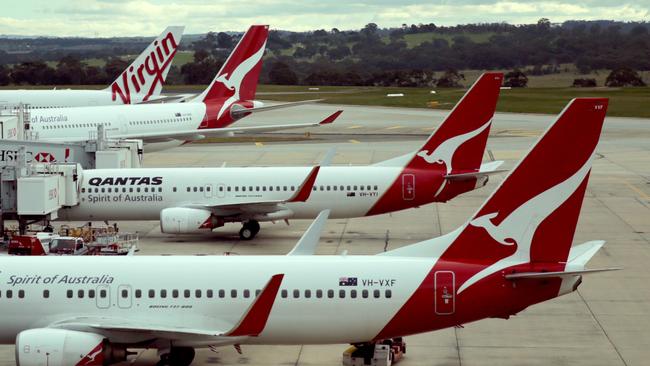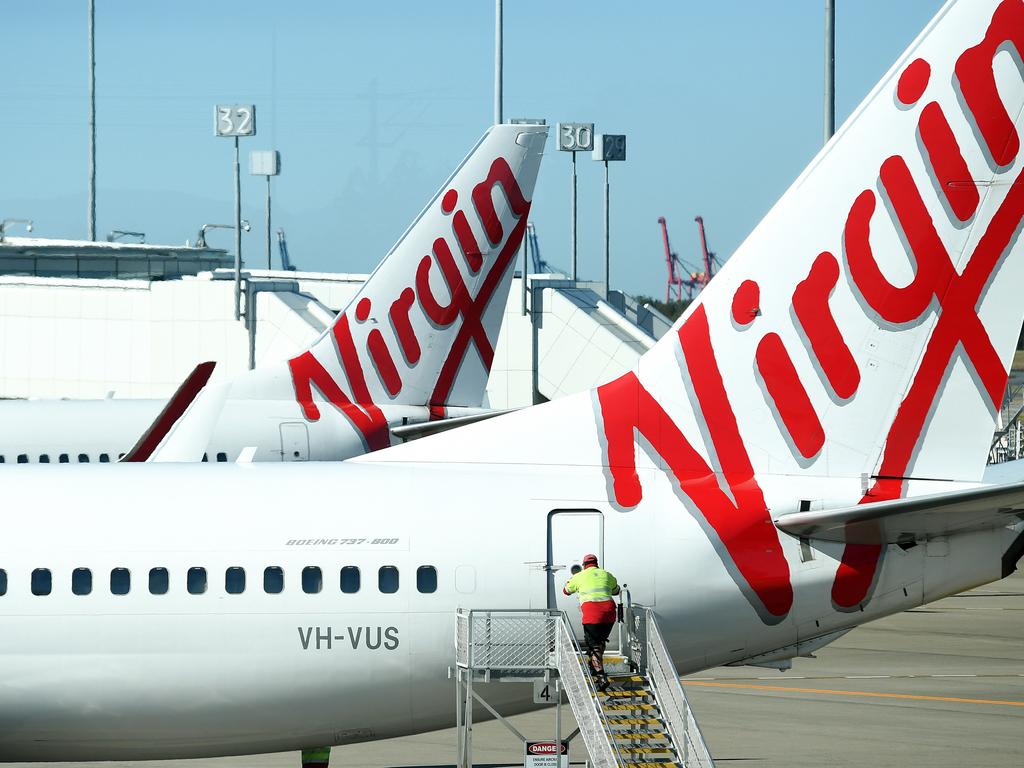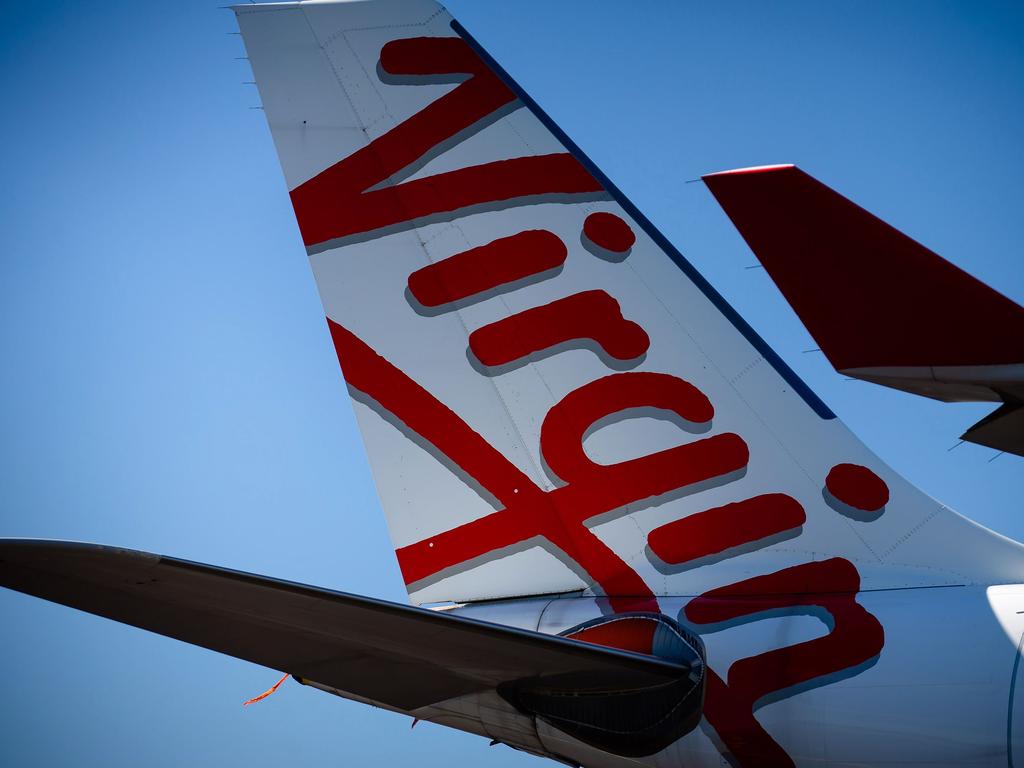ACCC told to watch airlines to give Virgin Australia a chance
Government takes action to ensure a Virgin recovery can’t be short-circuited by Qantas, which is already under fire for a go-slow on refunds.

Qantas has predicted that extra scrutiny by the competition watchdog will find only that the airline is using its aircraft to generate extra cash rather than leaving them on the ground.
The Australian Competition and Consumer Commission has been directed by the federal government to monitor the domestic airline industry over the next three years, in an effort to give a renewed Virgin Australia the best chance of succeeding.
Treasurer Josh Frydenberg said Australia’s national interest was best served through having a sustainable, competitive aviation sector.
To that end, he said he had asked the ACCC to monitor prices, costs and profits in the domestic air passenger sector.
“A key matter covered will be the level of capacity the airlines are putting on each route and whether this is occurring in a way that may damage competition,” Mr Frydenberg said.
“The ACCC will release reports at least quarterly.”
ACCC Chairman Rod Sims welcomed the direction from government and the “opportunity to ensure competition in the domestic travel market at this time”.
He said the commission would be looking out for any early signs of damage to competition in the domestic airline industry which could harm the long-term interests of consumers.
“This information can then be quickly acted on by the ACCC and/or provided to the government,” said Mr Sims.
A Qantas spokesman said Australia’s aviation sector was extremely competitive and all indications were that it would stay that way.
“What the ACCC can expect to find through its monitoring in the near term is Qantas and Jetstar flying its domestic aircraft to generate cash rather than leaving them on the ground costing money,” said the spokesman.
“This is good news for consumers because it means lower fares, good news for tourism because it will stimulate travel demand and good news for our people because it means more work.”
Mr Frydenberg indicated the move was a further example of the government’s support for the aviation industry as it navigated the coronavirus pandemic.
“This includes continuing to work constructively with the administrator in relation to the Virgin administration and supporting a market-based solution,” he said.
Action on cancelled flights
The treasurer’s direction came as the ACCC revealed it had pressured Qantas to do the right thing by customers whose flights had been cancelled or suspended due to COVID-19 restrictions between March 17 and May 31.
The watchdog received “hundreds of complaints from passengers” who only received travel credits in return for cancelled or suspended flights rather than the refunds to which they were entitled.
“We want to ensure that customers are aware that when Qantas suspends or cancels flights due to travel restrictions and fails to provide them with an acceptable alternative flight, they are entitled to a refund,” Mr Sims said.
This decision by Qantas to send a new email to customers in recent days to “remind” customers about their right to a refund followed weeks of pressure from the ACCC, but the ACCC said even the most recent communication was not particularly clear.
“From our perspective, from the outset, Qantas did not communicate clearly with customers about their rights and, in a large number of cases, simply omitted they were entitled to a refund,” Mr Sims said.
“We do appreciate that the airline industry globally is significantly impacted by the global COVID-19 pandemic, but I think that customers can and should expect better from Qantas, particularly when many of those customers may be out of work or experiencing financial hardship.”
A Qantas spokesman said well over a million bookings had been moved, refunded or turned into credits as a result of travel restrictions.
“We’ve worked hard to explain people’s options, especially during the period of time when there were almost weekly changes to where you could fly,” he said.
We didn’t think it was unclear to begin with, but we have written again to a group of customers in the window of time that the ACCC is concerned about to make sure they know what alternatives are available to them.”
Virgin Australia was not required to refund passengers for cancelled flights because the airline was in administration and customers were treated as creditors.
The challenges facing the aviation industry were underlined by new federal government data showing domestic passenger numbers fell an average of 96 per cent in April as aircraft operated with about 28 per cent of seats filled.
Brisbane trumps Sydney
As a result of the massive downturn, Brisbane Airport overtook Sydney as Australia’s busiest domestic terminal thanks to the ongoing fly-in, fly-out services operating in Queensland.
Statistics compiled by the Bureau of Infrastructure, Transport and Regional Economics for April showed close to 55,000 passengers passed through Brisbane Airport in the month, almost 7000 more than Sydney.
Melbourne Airport was ranked third with 42,200 passengers, followed by Perth and Adelaide.
Then Townsville made a surprise appearance in the top ten in the place of the Gold Coast which disappeared from the rankings entirely due to the crippling effect of the pandemic on tourism.
The figures came as Sydney Airport released its May data, showing an improvement in domestic passenger numbers for the month, to 62,000. International traffic continued to fall however, sinking to 29,000 passengers through Sydney in May compared to 43,000 the previous month.
A statement from Sydney Airport to the ASX noted that the downturn in passenger traffic was expected to persist until government travel restrictions were eased.
Qantas, Jetstar and Virgin Australia have started ramping up domestic services with the three carriers set to fly a total of more than 600 return flights a week from early July.








To join the conversation, please log in. Don't have an account? Register
Join the conversation, you are commenting as Logout